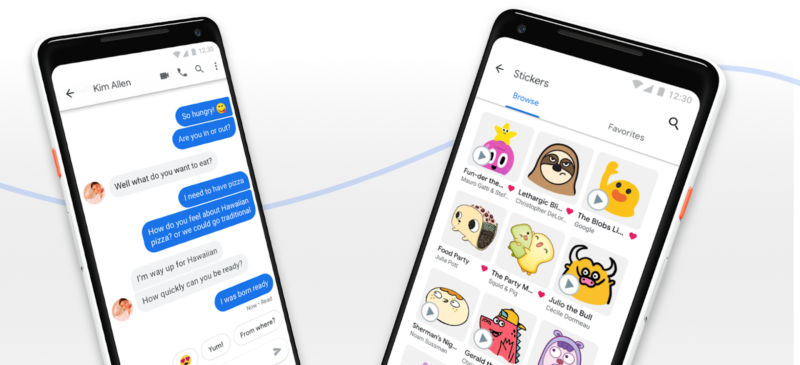
Will RCS ever matter? The standard has been hanging around for years as an upgrade to the aging carrier SMS texting standard, but since the carriers are in charge of it, the Rich Communication Service (RCS) has been going nowhere fast. Google is apparently tired of waiting for the carriers, and after launching its own RCS service in the UK and France earlier this year, the industry giant is now bringing its own RCS implementation to the United States, carriers be damned.
Google is rolling out RCS through the Google Messages app, Google’s ninth messaging app after Google Talk, Google Voice, Google Buzz, Google+ Messenger, Hangouts, Spaces, Allo, and Hangouts Chat. Users of Google’s app will eventually see a notification to “Do more with Messages,” and then they’ll be able to “enable chat features” which is RCS. Google says it will start enabling this for US users “in the coming weeks” and the service will be “broadly available in the US by the end of year.”
RCS is pretty lame as a messaging standard in 2019, but remember this is a replacement for SMS—the spec has been driven by the carriers that are members of the GSMA. So you’ve got to lower your expectations. RCS upgrades carrier messaging with functionality like typing indicators, presence information, location sharing, group messages, longer messages, and better media support. These are all things you would expect from any over-the-top instant messaging app in the modern era, but as a carrier-integrated replacement for SMS, these basics are still not there yet.
The service isn’t end-to-end encrypted, so Google or your carrier (or the NSA) could read your messages. It also treats your phone number as your primary identity, giving carriers an unnecessary amount of power over your identity. Again, this makes a ton of sense when carriers are designing the spec. They want to make themselves the center of your communication life, and clear text gives them a better opportunity for monetization. Why would a non-carrier want to use this standard, though?
Since RCS is so basic, it isn’t really a great standard for a messaging service. The only power RCS has comes from the fact that your carrier might do it, which would instantly upgrade the baseline messaging service it offers on (at least new) phones. RCS’s power comes from it being the default. Google’s version of RCS isn’t the default, though. You need to download the Google Messages app to use it, and Google Messages isn’t the default texting app on most phones. The app is not required to ship alongside the Play Store like Gmail, Google Maps, Search, and other top-tier Google apps, so most OEMs don’t ship it at all. Instead, they opt for their own messaging app.
Most users would have to download the app, dig into the system settings to make it the default app, and then dig into the Google Messages settings to turn on RCS. By removing RCS’s defaultness, Google basically took a limited, poorly crafted chat standard and rolled its own over-the-top messaging service with it. And what’s the point of that?
It is possible for RCS implementations to be federated with a feature called “Universal Profile” which allows for something like Google RCS to talk to carrier RCS. For this to work, carriers would need to Do The Right Thing and opt-in to interoperability, though, and the whole reason Google is rolling its own RCS service is because carriers can’t be relied on to do the right thing. So far, only Sprint and US cellular have implemented Universal Profile. It is also assumed that Apple will never support RCS on its devices, as it could threaten the dominance of iMessage in places like the United States.
And as far as instant messaging services go, Google’s “Messages” app is bad. A big part of the appeal of iMessage and Google Hangouts is that there are clients for everything, so your messages don’t have to be locked to your smartphone anymore. Google Hangouts has apps for Android phones and tablets, iOS phones and tablets, an always-on Chrome app that works on Windows, Mac, Linux, and Chrome OS, a website at hangouts.google.com, integration with Gmail.com, and even apps for smartwatches.
Google Messages has… an Android app? Oh, there’s also a website that requires you to log in with your phone, instead of just logging in with your Google account. Hangouts and Google Messages RCS are nowhere near comparable, and RCS is an across-the-board downgrade, aside from the fact that Google actually cares about the Messages app, for now, and the company wants to kill Hangouts.
Google’s original plan was to get carriers onboard with its RCS implementation, which it created when it acquired Jibe Mobile in 2015. The carriers were not interested in turning over messaging control to Google, though, and after years and years of petitioning from Google and consumers, eventually Verizon, AT&T, Sprint, and T-Mobile went behind Google’s back to create the “Cross Carrier Messaging Initiative (CCMI)” in October 2019. The four carriers will now begin to implement RCS together and hope to launch a new app by sometime next year.
Google seemed completely caught off guard by the development and eventually issued a response saying “We remain committed to working with the Android ecosystem to further enhance the messaging experience on Android with RCS.”
The earlier Google RCS launch in the UK and France might have been a warning shot, but it seems with the carriers declaring they’re doing RCS on their own, Google is less worried about stepping on toes with its version of RCS. Google has failed at messaging an astonishing number of times—is a very basic messaging platform with no encryption and limited platform compatibility really enough for it to succeed this time?
https://arstechnica.com/?p=1602127

